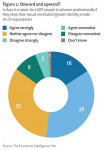China moves up global innovation rankings but innovationtechniques still lag global best practice
Unlocking innovation in China presents the results of the China survey and interviews with top executives in China. An impressive 83% of survey respondents say senior management at their companies are focused on transforming ideas into the most profitable innovations possible. But the Economist Intelligence Unit found there are differences in how innovation occurs in China and globally, with some sharp contrasts between this study and that of a 2006 survey of 485 executives worldwide.
The new study highlights some high-profile technological advances that Chinese firms have made in areas such as aerospace and defence, biomedicine and energy. But Chinese companies are also finding ways to compete globally through innovating simple, low-cost solutions that give them an edge on price or in the customisation of products. Nonetheless, the report points out that they face challenges in their drive towards innovation.
Key findings of the report include:
· Chinese companies fail to draw the wider organisation into the innovation process, relying instead on R&D departments. Whereas sales and marketing play the leading role in generating new ideas within most global companies, in China it is R&D departments that drive innovation. Sixty-seven percent of respondents in China say that ideas for new products and services are most often generated by the R&D department, compared with 42% who said so globally.
China’s companies are already aware that a tighter focus on the consumer will enhance innovation, however. Forty-three percent say that changes in consumer tastes or habits are the source of their organisation’s most successful innovations.
· Companies in China would benefit from intensifying their interaction with partners and suppliers to generate new ideas. The survey shows that China lags in applying the concept of open innovation, in which ideas are allowed to flow among organisations. Only 17% of respondents there say partners are important sources of new ideas, compared with 34% in the global survey. In interviews, Chinese executives often cited a lack of trust, including the fear of reverse engineering or pirating, as a reason for not working with external organisations.
· To improve China’s position as an engine of innovation, the country needs highly skilled managers. Survey respondents recognise the importance of leadership skills: 99% say it is “very significant” or “significant” to innovation. But although the government has invested heavily in the physical underpinnings for innovation, China continues to lag in building up its management capacity. It needs leaders who can help it complete the transformation of its production system and tear down rigid hierarchies within companies. Organisations can only benefit from improving the retention of top managers who can foster innovation.
· The government has an important role in creating an environment that is conducive to innovation. Financial regulations, tax policies and technical standards affect the ability of companies to innovate, and to profit from their innovations. But the most important national factor that government can provide is macroeconomic stability, according to 52% of respondents in China.
“China is becoming a more innovative economy, but to maintain momentum it will have to focus not just on glamorous technology programmes but also on the more basic tasks, such as maintaining macroeconomic stability and developing leadership skills, that enable innovation to flourish,” says Katherine Dorr Abreu, senior editor at the Economist Intelligence Unit.
Notes for editors
Unlocking innovation in China is an Economist Intelligence Unit report, sponsored by Cisco. The research is based on an online survey, fielded in Chinese, of 181 senior executives in China. It was conducted by the Economist Intelligence Unit in November 2008. A total of 32 regions are represented in the survey, although most of the respondents are located in Beijing (13%), Jiangsu (12%) and Shandong (11%). The survey encompasses a variety of ownership structures: 27% are from state-owned enterprises or owned by provincial or municipal governments; 26% are from wholly owned foreign operations; 22% from private Chinese concerns, and 18% from joint ventures. They represented a wide range of company size: 28% with annual revenues of $100m or less, 29% between $100m and $500m, 8% between $500m and $1bn, and 34% more than $1bn. They represent a broad range of industries, but manufacturing accounted for 35% of respondents and financial services for another 12%. Forty-one percent are C-level executives. They have a broad range of functions, with 35% responsible for general management, 17% for customer service and 15% for finance. The quantitative survey was supplemented by interviews with executives in China.
About the Economist Intelligence Unit
The Economist Intelligence Unit is the world leader in global business intelligence. It is the business–to–business arm of The Economist Group, which publishes The Economist newspaper. As the world's leading provider of country intelligence, the Economist Intelligence Unit helps executives make better business decisions by providing timely, reliable and impartial analysis on worldwide market trends and business strategies. More information about the Economist Intelligence Unit can be found at www.eiu.com or visit us on www.twitter.com/theeiu.
웹사이트: http://www.eiu.com
연락처
Joanne McKenna
Press Liaison
+44 (0)20 7576 8188
이메일 보내기
이 보도자료는 Economist Intelligence Unit가(이) 작성해 뉴스와이어 서비스를 통해 배포한 뉴스입니다. 뉴스와이어는 편집 가이드라인을 준수합니다.




